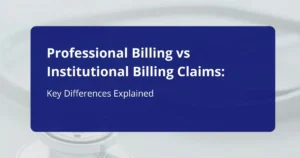You go to the doctor with symptoms such as dizziness, fainting, and fatigue, and then you are faced with the idea that one of the causes is hypotension, that is, low blood pressure. Some people might not pay as much attention to it as to high blood pressure, yet it is equally important. To coders and medical professionals, it is good to know the correct ICD hypotension codes to use them in proper documentation, billing, and treatment planning.
In this article, we are going to examine the ICD-10-CM code of hypotension (I95.9). We will also go through various kinds of hypotension, its causes, and code use in different cases. It will all be explained clearly and simply, so that you do not need a medical degree to understand anything here!
What is Hypotension?
In medical terms, Hypotension is another name for low blood pressure. Your body and brain do not receive the required blood in this situation. This may cause symptoms like
- Light-headedness
- Blurred vision
- Fainting
- Fatigue
- Cold, clammy skin
Because of their genetic makeup, not all humans have low blood pressure, but serious issues can also develop.
What is the ICD-10 Code for Hypotension?
The ICD-10-CM code for unspecified hypotension, I95.9, is the most popular in cases where the cause of the low blood pressure is not evident. This code falls under Chapter I, which contains codes of circulatory system diseases. It assists doctors and billers in classifying and reporting low blood pressure in a standardized manner.
Standard Terms You See
- Diagnosis code for hypotension = I95.9
- DX code for hypotension = I95.9
- ICD 10 low blood pressure = I95.9
- Hypotensive ICD10 = I95.9
Other ICD-10 Codes for Different Types of Hypotension
Low blood pressure is not always the same. The condition and cause usually determine the ICD hypotension code one should apply. These are some of the variations:
1. Orthostatic Hypotension
The disorder arises when the blood pressure drops as soon as you stand up fast. It may give you the impression that you are dizzy or faint.
- ICD-10-CM Code: I95.1: This code will be employed if it is clear that the doctor has diagnosed orthostatic hypotension.
2. Chronic Hypotension
When any acute factor is behind your low blood pressure, it leads to chronic hypotension.
- ICD 10 code: I95.89: It applies when hypotension is continuous or connected to a chronic problem.
3. Hypotension Due to Hypovolemia
It occurs when your body eliminates a lot of blood or fluid, water, or blood.
- ICD 10 code: I95.5: This is administered by doctors when the low blood pressure is associated with fluid loss.
4. Transient Hypotension
This is a temporary form and can be caused by a provisional illness, an adverse drug reaction, or a surgical impact.
- Transient hypotension ICD 10: I95.81: It is basically used for short-lived and temporarily resolved hypotension condition.
Why Is Accurate Coding Important?
In the medical field, accurate coding helps in Proper patient treatment, Clear medical records, Correct insurance billing, and tracking patient history. Applying either the correct ICD 10 code for hypotension unspecified or a more specific one will fully describe the patient’s condition.
When Do Doctors Use I95.9?
The I95.9 code comes in when a patient is diagnosed with hypotension, but the type and cause are not yet evident. To understand, take an example of a person coming to the emergency room with clear signs of fainting and dizziness. The blood pressure recorded is very low, but what causes this remains a mystery. In this case, the ICD-10 low blood pressure code I95.9 may be used until further tests are done.
Important Notes on ICD-10 Coding for Hypotension
Here are a few helpful points:
- Do not apply I95.9 when the nature of the hypotension is identified. Instead, follow a narrower code, such as I95.1 or I95.5.
- When handling a patient, make it a practice to check the complete condition, i.e., causes, and any other illnesses.
- Revisit the coding rules, particularly insurance or hospital-related ones.
What is L25.9? Why Is It Mentioned Here?
L25.9 does not have any relationship to hypotension. In medical debates or when filling in the data, codings irrelevant to a particular record can slip into the same record. That is why, be attentive in choosing the appropriate DX code for hypotension; it does not mix with a symptom like L25.9 connected with skin problems.
Difference Between Hypotension and Hypertension (ICD Codes)
One can confuse low blood pressure (hypotension) with high blood pressure (hypertension), though they are essentially opposite.
For hypotension, use
- I95.9 (unspecified)
- Other I95 codes, depending on the cause
For hypertension, use
- I10 – Essential (primary) hypertension
- This is the main hypertension ICD code 10
So remember:
- I95.9 = Low blood pressure
- I10 = High blood pressure
If these two are mixed, it leads to serious errors in treatment or billing.
When Should You Use Each Code?
| Condition | Code | Description |
| Hypotension – Unspecified | I95.9 | Low BP without a known cause |
| Orthostatic Hypotension | I95.1 | Low BP from standing up |
| Chronic Hypotension | I95.89 | Long-term low blood pressure |
| Hypotension Due to Hypovolemia | I95.5 | Low BP from fluid loss |
| Transient Hypotension | I95.81 | Temporary low blood pressure |
| Hypertension – Essential | I10 | High blood pressure (not caused by disease) |
| Contact Dermatitis – Unspecified | L25.9 | Not related to blood pressure |
Final Thoughts!
Learning the ICD 10 code for hypotension unspecified (I95.9) can be a great approach to case management and patient health records. As a health practitioner, a coder, or anyone looking to decode a healthcare report, it is always good to know these codes to stay on top of things.
Recording in the most specific manner possible is never a bad habit when presenting such medical problems. However, when you are not really sure about what kind of hypotension it is, it is both safe and correct to start with I95.9. At least now you will know ICD hypotension, low blood pressure ICD 10, or hypotensive ICD10, what these words, ICD hypotension, low blood pressure ICD 10, or hypotensive ICD10, mean and when and how wrong or right to use them.
In some cases, hypotension may occur alongside serious conditions like pulmonary edema (J81 ICD-10 code), making accurate diagnosis and documentation even more crucial.




